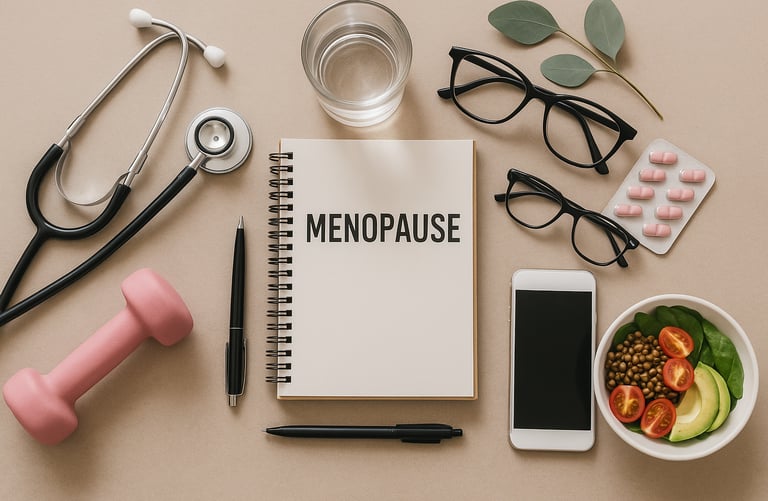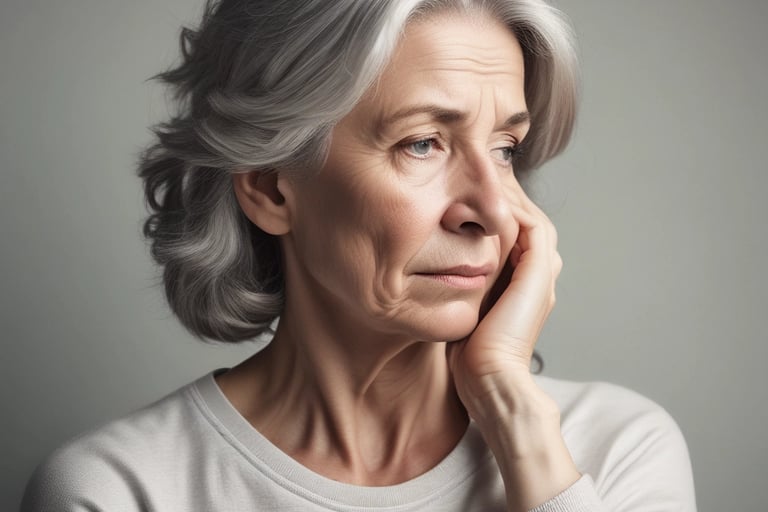Why Menopause Symptoms Get Worse in Winter (And What Actually Helps)
I can't tell you how many women I've talked to who've said, "I thought I was going crazy – my symptoms are so much worse in winter!"
If you've noticed your menopause symptoms shifting with the seasons, you're not imagining it—and you're definitely not alone.
Winter can be a particularly challenging time for women experiencing menopause or perimenopause. While hot flashes might seem like they'd be welcome during cold weather, the reality is quite different. Many women find their symptoms actually intensify during the cooler months, leaving them feeling frustrated and unprepared.
Let's explore why this happens and, more importantly, what you can actually do to find relief.
The Science Behind Winter Menopause Struggles
Recent research has confirmed what many women have long suspected: menopause symptoms do exhibit seasonal variation, with winter presenting unique challenges. Studies published in leading menopause journals show that hot flashes, joint pain, mood changes, and skin issues can all worsen during the colder months.
Why Your Body Struggles More in Winter
Your Internal Thermostat Goes Haywire During menopause, declining estrogen levels affect your body's ability to regulate temperature. Hot flashes occur because of a narrowing of the thermoneutral zone in the hypothalamus, meaning even slight changes in body temperature can lead to discomfort and sweating. Winter makes this worse because frequent transitions between cold outdoor environments and heated indoor spaces can trigger sudden heat surges and make hot flashes harder to manage.
The Vitamin D Connection Shorter winter days mean less sunlight exposure, leading to vitamin D deficiency. This becomes particularly problematic during menopause because vitamin D is crucial for bone health, mood regulation, and immune function—all areas already impacted by hormonal changes.
Joint Pain Amplification Cold, damp weather can cause joint pain even in healthy individuals, but for women experiencing menopause, this effect is magnified. Declining estrogen contributes to joint stiffness and bone density loss, which cold weather can significantly aggravate.
Skin and Sleep Disruptions Winter air—whether from heating systems or naturally dry conditions—exacerbates the skin dryness that many women experience during menopause. Additionally, the combination of warm bedding and night sweats can create a perfect storm for disrupted sleep.
Mood and Energy Changes The combination of reduced daylight (contributing to seasonal affective symptoms) and fluctuating hormones can intensify mood swings, anxiety, and fatigue that often accompany menopause.
Universal Relief Strategies That Actually Work
1. Master Smart Layering
The key to managing temperature fluctuations is strategic dressing. Start with moisture-wicking fabrics as your base layer, add removable middle layers, and always have something you can quickly shed when a hot flash strikes. Keep a small fan or cooling spray handy for instant relief.
2. Prioritize Sleep Hygiene
Creating the right sleep environment becomes even more critical in winter. Keep your bedroom cool (around 18-20°C), invest in moisture-wicking sleepwear and bedding, and consider a cooling mattress topper. For comprehensive guidance on creating the ideal sleep environment during menopause, explore our resources section which includes detailed sleep optimization tips.
3. Support Your Nutritional Needs
Winter often brings cravings for comfort foods, but focusing on anti-inflammatory foods, calcium-rich options, and mood-supporting nutrients can make a significant difference. B-complex vitamins are particularly important for energy production and mood regulation during the winter months.
4. Stay Active Despite the Weather
Regular exercise helps manage menopause symptoms year-round, but it's especially important in winter for mood regulation and joint health. Find indoor alternatives when weather doesn't cooperate—yoga, swimming, or even dancing can help maintain your routine.
Queensland-Specific Advantages and Strategies
If you're experiencing menopause in Queensland, you actually have some distinct advantages when it comes to managing winter symptoms.
Your Sunshine State Benefit
Queensland women are fortunate to live in a region where vitamin D deficiency rates remain relatively low even in winter. According to Australian health data, only 6% of Queensland residents experience vitamin D deficiency compared to much higher rates in southern states. However, you can still optimize this advantage:
For Brisbane Women:
Take advantage of winter river walks along the Brisbane River pathways
Enjoy outdoor coffee meetings in South Bank or the Botanic Gardens
Consider weekend markets like those at South Bank for gentle sun exposure
Gold Coast Strategies:
Maintain your beach walking routine during the milder winter days
Utilize the extensive beachfront paths for morning exercise
Take advantage of the abundant outdoor dining options
Sunshine Coast Opportunities:
Continue coastal walks along the beautiful beaches
Explore the hinterland trails during the pleasant winter weather
Make use of the many outdoor yoga and fitness classes available year-round
Accessing Professional Support in Queensland
When self-care strategies aren't enough, professional help is essential. Queensland offers excellent menopause care across the state. Our comprehensive directory of menopause specialists includes experienced practitioners throughout Brisbane, the Gold Coast, and the Sunshine Coast who understand the unique needs of women during this transition.
These healthcare professionals can help with:
Hormone replacement therapy (HRT) options
Non-hormonal treatment alternatives
Comprehensive symptom management plans
Nutritional counseling and supplement guidance
Local Resources and Community Support
Queensland's mild winter climate also means you can maintain many outdoor activities that support overall wellbeing:
Beach walking and swimming in heated pools
Cycling along the extensive bike path networks
Outdoor fitness classes in parks and recreation areas
Community groups and support networks
For additional resources including local support groups, exercise programs, and educational materials specifically designed for Queensland women, visit our blog section where we regularly share updated information about menopause management and local healthcare options.
When to Seek Professional Help
Don't suffer through worsening winter symptoms alone. Consider reaching out to a healthcare provider if you experience:
Hot flashes that significantly disrupt daily life or sleep
Joint pain that limits your activities
Mood changes that affect your relationships or work
Sleep disturbances lasting more than a few weeks
Any symptom that impacts your quality of life
Taking Control of Your Winter Menopause Journey
While winter can amplify menopause symptoms, understanding why this happens empowers you to take proactive steps. Whether you're dealing with temperature regulation challenges, mood fluctuations, or physical discomfort, effective strategies exist to help you navigate this season more comfortably.
Remember, menopause is a natural transition, but you don't have to struggle through it alone. With the right combination of self-care strategies, professional support when needed, and the advantages of Queensland's climate, you can manage winter symptoms effectively while maintaining your quality of life.
Your experience is valid, your symptoms are real, and relief is possible. Take it one day at a time, be patient with yourself, and don't hesitate to reach out for support when you need it.
For comprehensive menopause support and to connect with experienced practitioners who understand your journey, explore the resources available at QLD Menopause. From finding the right healthcare provider to accessing educational materials and community support, we're here to help Queensland women navigate menopause with confidence.






Support
Contact
info@qldmenopause.com
© 2025. All rights reserved.
Information is general and not a substitute for medical advice. Confirm services, fees, and availability with the clinic.
